The printed version of this eBook is the 10 Questions & Answers on Atheism & Agnosticism pamphlet, ISBN-13: 9781596361232
Authors:
Norman L. Geisler , M.A., Th.B., Ph.D., is the founder and Dean of Southern Evangelical Seminary and the Veritas Graduate School of Apologetics. He is author of numerous books on apologetics and theology, many of which are considered standard texts in Christian colleges throughout the world.
Alex McFarland , M.A., is the president of Southern Evangelical Seminary, has written several books on apologetics, and has spoken internationally.
Robert Velarde is a former atheist. He is the author of Talking Sense with C.S. Lewis and The Lion, the Witch, and the Bible . He is pursuing graduate studies in philosophy via Southern Evangelical Seminary.
Very special thanks to Christina Woodside, Warren Smith, and Brent Ashby for their editorial contributions.
Scripture taken from THE HOLY BIBLE: NEW INTERNATIONAL VERSION. NIV. Copyright 1973, 1978, 1984 by International Bible Society. Used by permission of Zondervan. All rights reserved.
It is illegal to photocopy, transmit electronically, post on the internet, or reproduce this pamphlet in whole or in part in any form.
2007 Bristol Works, Inc.
Rose Publishing, LLC
PO Box 3473
Peabody, Massachusetts 01961-3473 U.S.A.
Email: info@hendricksonrose.com
www.hendricksonrose.com
All rights reserved.
Build: 2021-12-21 13:33:52 EPUB 2.0
10 Questions & Answers on Atheism & Agnosticism
This handy eBook:
- Provides a comprehensive yet easy-to-understand examination of what atheists and agnostics believe and also explains the evidence for the biblical God.
- Answers key questions, such as What can we know about the existence of God? What can we know about right and wrong? Is belief in God compatible with science? And more.
- Gives key insights from leading apologists Dr. Norman Geisler and Alex McFarland (President of Southern Evangelical Seminary).

What Are Atheism and Agnosticism?
The cosmos is all that is or ever was or ever will be.
Carl Sagan
Atheism Claims...
Atheism disbelieves in the existence of God. The universematteris all that exists. The universe operates via natural physical laws. Any event that may seem supernatural is really a natural occurrence. Miracles do not occur. The reality of evil, the apparent purposelessness of life, the seeming randomness of the universe, and the fact of evolution all argue against the existence of God. Christianity is false. The Bible is an error-filled book of flawed human origin. Jesus, if he even existed, performed no miracles, did not rise from the dead, and was not God.
Agnosticism Claims...
Agnosticism asserts that God may or may not exist. Since it is impossible to prove the existence or non-existence of God, we just dont know if God exists or not. A universal, hard or aggressive agnostic denies that anyone can answer the question of God. The only wise course of action is to reserve judgment and remain skeptical. A local, soft or modest agnostic claims that the evidence for or against God is not enough to warrant a decision. Therefore, such an agnostic remains undecided.

The Bible Teaches...
God exists and has chosen to reveal himself through creation, moral conscience, and the Bible.
From these sources of revelation, Christians conclude that God exists beyond the world (transcendent), yet is active in creation (immanent), created the world out of nothing ( ex nihilo ), is all powerful (omnipotent), all knowing (omniscient), ever present (omnipresent), and all loving (omnibenevolent).
The natural universe is not all that exists. Since God exists, miracles are possible.
The case for biblical Christianity as the best explanation of reality includes, but is not limited to: historical evidence, archaeology, philosophical integrity, and eyewitness testimony.
No deity will save us; we must save ourselves.
Humanist Manifesto II
You Should Also Know...
- The word atheist comes from the Greek a , meaning not or no, and theos , meaning God. An atheist embraces a belief system that says not God. The word agnostic is derived from the Greek gnosis (knowledge) and literally means no knowledge.
- Modern atheism emerged as a formal philosophy in the 19 th century. Many contemporary atheists prefer to be called humanists.
- The atheist says that nothing exists outside of the known physical universe. Agnosticism asserts that definite knowledge about God is unattainable. But the assertion, No one can really know anything for sure about God, is also a definitive statement regarding what one knows about God.

What Can We Know About the Existence of God?
The heavens declare the glory of God. Psalm 19:1
Atheism Claims...
Many atheists have a high regard for reason with a bias toward empiricism (that which can be measured by the senses). Since God cannot be measured and quantified, there is no viable evidence for his existence. Science and philosophical reasoning argue against the existence of God. Since evolution explains human origins, God is unnecessary. If the universe is eternal or can be shown to have come into existence spontaneously and by chance, then God is also unnecessary.
Agnosticism Claims...
Agnostics are skeptical of reason and all other systems of knowing. As a result, they shy away from claiming certain knowledge about reality or God. One cannot or does not know anything for certain; therefore one cannot or does not know if God exists. Although agnostics claim not to know whether God exists, many function as atheists.

The Bible Teaches...
Christianity has a high regard for reason, but recognizes its limitations in defining a God who is by nature unlimited. The God of the Bible has revealed much about himself that is conclusively knowable. God reveals himself through creation, communication through his Word, and conscience.
Creation Our complex universe shows evidence of a Creator. Sensory input from the physical world provides knowledge through which we know God. Sometimes called general revelation , these are things God reveals about himself through nature to everyone (Romans 1:20).
Communication The content of the Bible gives evidence of divine origin.This communication is called special revelation ; these are the things God told to specific people at specific times in history.
Conscience The moral law written on human conscience points to a Moral Lawgiver (Romans 2:14-15).
Next page
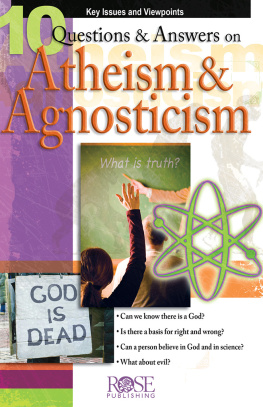


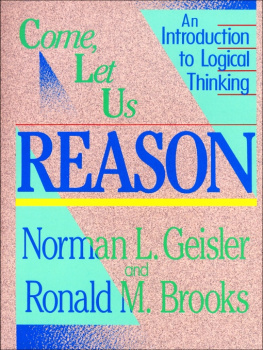

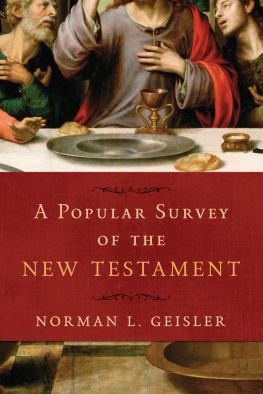
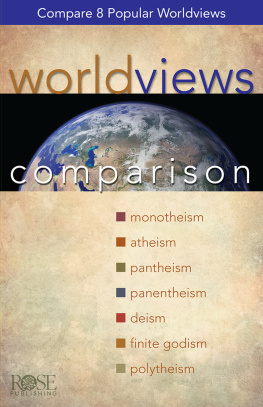
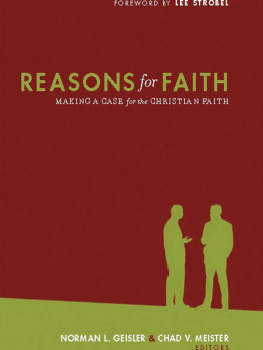
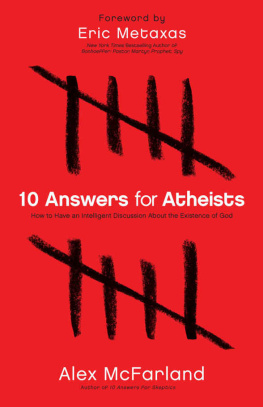



 What Are Atheism and Agnosticism?
What Are Atheism and Agnosticism? The Bible Teaches...
The Bible Teaches...
 What Can We Know About the Existence of God?
What Can We Know About the Existence of God? The Bible Teaches...
The Bible Teaches...